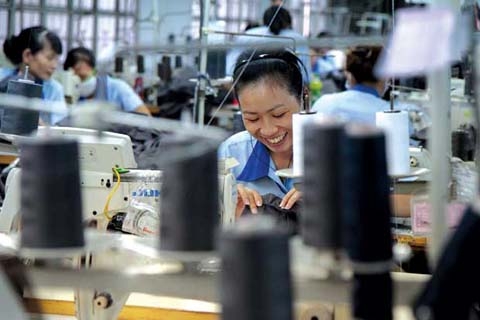SOEs to take more of a back seat
 The drafted reform, which for the first time also acknowledges the role of foreign investment, were trumpeted last Wednesday to seek feedback from Vietnamese people from all walks of life, both living in the country and overseas, until March 31, 2013.
The drafted reform, which for the first time also acknowledges the role of foreign investment, were trumpeted last Wednesday to seek feedback from Vietnamese people from all walks of life, both living in the country and overseas, until March 31, 2013.
Under the draft’s Article 54, “the Vietnamese economy is a socialist-oriented market-based economy featured by many forms of ownership and economic sectors. All economic sectors are an important part of the national economy and together develop in a long term, cooperative and equal basis, and compete before the law.”
This new declaration, not seen in the existing 1992 Constitution, was agreed upon by many National Assembly delegates and economic experts. It meant that the state-owned economic sector would not hold a pivotal role in the economy, and all economic sectors would compete equally before the law, said Nguyen Van Phuc, vice head of the National Assembly’s Economic Committee.
The draft amendment serves to codify policies already announced by the government requiring an overhaul of SOEs. At the Consultative Group Meeting for Vietnam in December, 2012, Prime Minister Nguyen Tan Dung told international donors that the government was restructuring SOEs and would “put SOEs into operations under the market-based economy and force SOEs to equally compete with enterprises from other economic sectors. SOEs’ operations and information will also be publicized and supervised.”
Phuc emphasised the draft’s acknowledgement of foreign investments. “As for foreign invested enterprises’ (FIEs) role in Vietnam’s economy, though the draft does not name FIEs’ role directly, Clause 2 of the draft’s Article 55 says that the state develops cooperation forms with foreign countries, territories and international organisations. This means FIEs’ role is highlighted in the Constitution,” Phuc told VIR.
Under the existing 1992 Constitution’s Article 19, “the state-owned economic sector shall be consolidated and developed, especially in key branches and areas, and play the leading role in the national economy.”
However, many National Assembly delegates said that though playing such a role and holding a large part of cash from the state coffers, the state-owned economic sector has been operating ineffectively.
According to the Central Institute for Economic Management (CIEM), state-owned enterprises (SOEs) currently use 87 per cent of total capital from the state budget, 70 per cent of Vietnam’s land and over 70 per cent of official development assistance-based capital. SOEs are also holding a great part in many important sectors like telecommunication, insurance, coal, electricity, cement and petrol.
However, CIEM reported, SOEs only create 28 per cent of gross domestic product growth, 20 per cent of industrial value and 24 per cent of Vietnam’s total registered enterprises. “SOEs’ contributions to the economy don’t match the resources they are using,” said CIEM’s vice head Nguyen Dinh Cung.
“When all economic sectors play equally in the economy within a legal framework, more positive changes for the country will be created,” said delegate Than Duc Nam representing central Danang city.
Delegate Nguyen Huu Quang, representing Thanh Hoa, said that over the long term the state-owned economic sector would not be able to play a key role in the economy due to the country’s deeper international integration. Moreover, the Constitution’s validity is far longer than other documents like resolutions and laws. “Thus, it is necessary to stipulate that all economic sectors must be equal in an economic playground,” Quang said.
What the stars mean:
★ Poor ★ ★ Promising ★★★ Good ★★★★ Very good ★★★★★ Exceptional
 Tag:
Tag:
Related Contents
Latest News
More News
- Human-centred governance seen as key to AI development (December 19, 2025 | 18:19)
- TECHFEST Vietnam 2025 links startups with policy and capital (December 15, 2025 | 18:21)
- Long Thanh International Airport welcomes first Vietnam Airlines test flight (December 15, 2025 | 18:01)
- Foreign fruits flood Vietnamese market (December 09, 2025 | 13:22)
- Vietnam’s fruit and vegetable exports reach $7.8 billion in first 11 months (December 05, 2025 | 13:50)
- Vietnam shapes next-generation carbon market (November 26, 2025 | 15:33)
- PM urges Ho Chi Minh City to innovate and remain Vietnam’s economic locomotive (November 26, 2025 | 15:29)
- Experts chart Vietnam's digital finance path: high hopes, high stakes (November 14, 2025 | 10:56)
- Vietnam’s seafood imports surge 30 per cent in first 10 months (November 10, 2025 | 19:35)
- Vietnam’s durian exports hit $1 billion milestone (October 30, 2025 | 17:41)






















 Mobile Version
Mobile Version